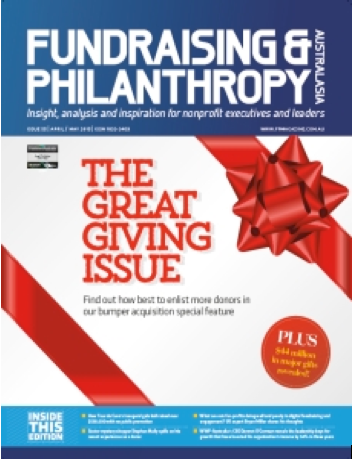You’ve probably got a fantastic database. But have you ever considered that another charity might have one just as good? Glenn Harrison recommends you start sharing your supporter data with other charity members of a data co-operative.
If you run your charity’s fundraising department and are gearing up for direct mail to bring in new supporters, then you now have a choice. You could opt for a cold list on which you would probably make a 50 per cent or so loss in the first year and hope to start turning a profit two or three years down the line. Or you could go for a transactional data co-operative mailing that would probably make you as much in the first year as you’d lose on a cold mailing.
Transactional data co-operative mailings are so effective because they tap directly into the postal donor pool – that group of people in New Zealand who support two or more charities by direct mail. List brokers identifying names for charities to mail to are trying to find people who are in this pool. They’ll look for people who’ve filled in a lifestyle survey saying they support charities or people who buy various goods by mail order, and any company director who can afford to give to charity.
But by far and away the best source of new supporters will be those people who already give to another charity. They have bought into the concept of charity giving and have already made a commitment. These people are so much more likely to give again.
Conexum operate the Insight data co-operative, the largest shared transactional marketing database of its kind in Australasia. Over 108 members across the not-for-profit, publishing and multi-channel retailing sectors contribute their donor and customer data. Each member provides a copy of their entire database and identifies which records they are happy to share and which are just to be used as a suppression file. The data on the Insight data co-operative database totals over 2.7 million multi transactor records in Australia and over 450,000 records in New Zealand. By merging all this data onto one database, we are able to look at the overlaps between each of the contributing member files. For example, how many people support Charity A who are also on the Charity B database?
We typically see overlaps across each of the charity member files are usually between 75% – 85%. This means around 7 – 8 out of every 10 supporter names held on your database are already giving to other charities. Those unique to your charity are then excluded, as only the matched multi supporter names are then used within the data co-op.
As a contributing member of the data co-op you pay NZ$0.16 per name which is around half the cost compared to other list rental files. All data supplied from the data co-op is net of your existing donor file. In other words names you don’t already have on your database.
ROI
Just as with response rates, return on investment (ROI) will vary from charity to charity. Names selected from the data co-op will usually deliver results around 4% – 7% meaning that a charity is able to affordably recruit new donors onto their database ~ in most instances the new donors acquired will be cash positive from day one. One charity member has even reported a response rate as high as 23% from a cold mailing using names selected from the data co-op. Look to past donors for future donations!
After donor recruitment, the constant issue for all charities is trying to identify what to do with dormant donors who have not given for sometime. Membership of the data co-op can help to identify those lapsed donor names on your database who are still actively giving to other charity members.
Upgrading your current donors to a higher level.
The data co-operative can also aid you in identifying which of your single cash donors is a regular monthly donor to another charity. This will allow you communicate to a specific group of names on your database to encourage them to be upgraded to a new level of giving.
New Zealand Privacy Guidelines for Data Co-operatives
What you need to do to cover your organisation for carrying out transactional data co-operative mailings.
Check that your recruitment devices all carry a suitable opt-out statement.
New but proven
The data co-operative concept was pioneered in the US over 20 years ago, and has been introduced into the UK, France, Germany, Australia and now New Zealand. It is a proven concept and represents an exciting new development for the not-for-profit sector in New Zealand.
For more information, please contact Glenn Harrison on +612 9340 7019 or
Click here to download a pdf of this article.











